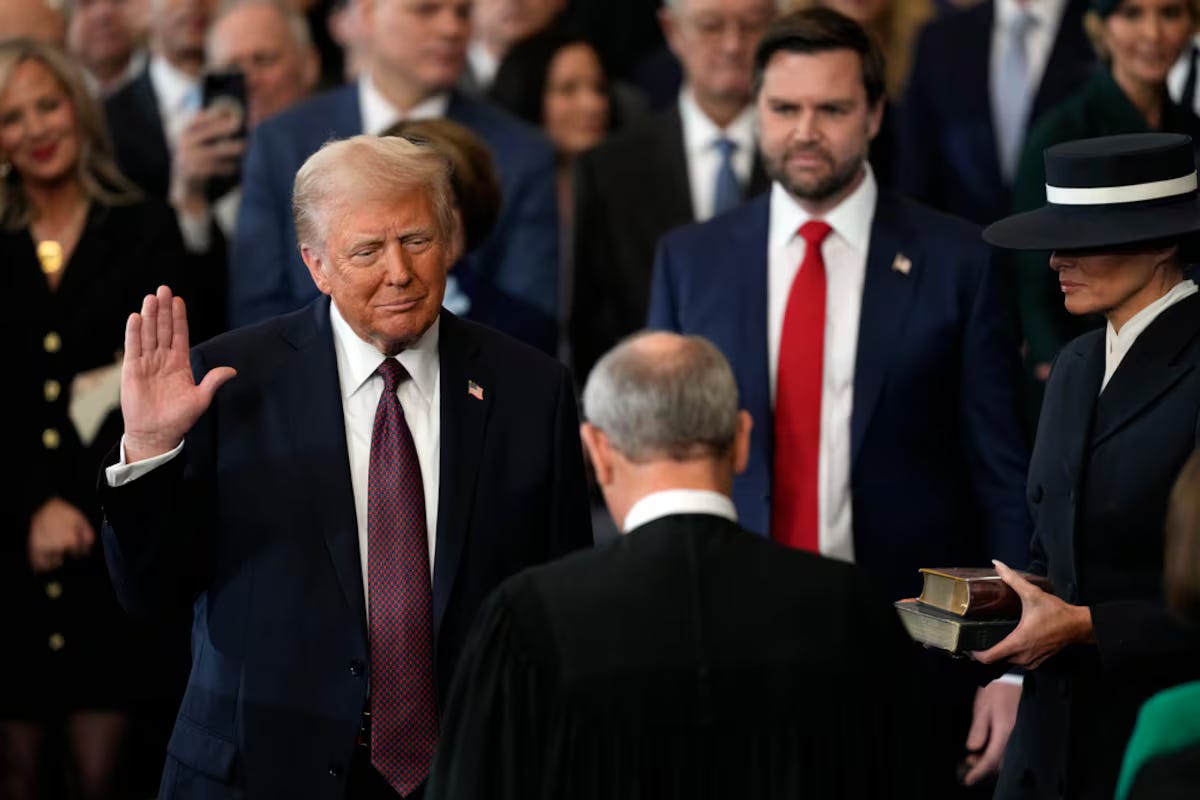Early executive orders preview an emboldened Trump 2.0
Plus, some reading recommendations and a preview of this semester's speakers at John Brown University

The early stages of a new presidency always fascinate me. Usually a president’s first weeks involve a flurry of unilateral activity emanating from the White House, aiming to change course from the previous administration. We also see a new president and his staff learning the ropes of governing, with the expected missteps and blunders along the way.
This time, so far, is markedly different. Donald Trump was sworn in as the nation’s 47th president last week after having already served as its 45th. He becomes just the second person (and the first in 130 years) to serve a second term after losing a previous bid for reelection. As such, Trump 2.0 has some of the feel of a new administration (with executive orders, policy shifts, and the like) without the typical hiccups.
Trump’s actions as president in 2025 have been largely expected. He has issued a number of executive orders related to immigration, the most controversial of which seeks to effectively end birthright citizenship for people born in the United States to undocumented parents.1 This order has already been challenged in court, and I would assume it’s eventually struck down as unconstitutional given the language of the 14th Amendment and more than a century’s worth of legal precedent.
Trump’s other executive actions to date include reinstating the Mexico City Policy,2 attempting to abolish Diversity, Equity, and Inclusion programs in the executive branch, and pausing trillions of dollars worth of loans and grants across the federal government.
The rollout of this latter order—and the confusion accompanying it—has been particularly interesting to watch. It fits the theme of Trump and his allies (including Elon Musk and the meme-inspired Department of Government Efficiency), and it promises to be a popular move among fiscal hawks in Washington. At the same time, the announcement raised more questions than it answered, with nonprofits, charity groups, and even individuals (such as student loan recipients) wondering whether their funding would suddenly halt.3
And just yesterday the administration announced a bold policy regarding the vast federal bureaucracy, emailing over two million federal workers and promising them eight months of pay and benefits in exchange for their resignation by February 6. The program would accomplish two aspects of Trump’s agenda: shrinking the bureaucracy, and eventually installing more people friendly to Trump’s policy agenda.
These orders and actions are in line with Trump’s rhetoric on the campaign trail and will no doubt be applauded by his most ardent supporters, but rhetoric and policy are fundamentally different things. It remains to be seen how the public in general will respond, especially given the fickle and impermanent nature of public opinion.
Some Reading Recommendations
Prof. Michael McConnell on The Supreme Court's Religion Docket
McConnell is one of the country’s leading experts on law and religion, and here he previews upcoming cases reflecting this relationship
Faithfully political: A helpful but incomplete look at Christianity and politics
James Wood reviews an important new book on Christianity, citizenship, and political engagement
Would You Rather Be Free from Sin or from State Regulation?
David VanDrunen reviews the latest book from Brad Littlejohn, on renewing the idea of a freedom in a political environment celebrating individual liberty
Miles Smith, responding to an essay on the inherent relationship between politics and religion, remarks, “There’s never been a time in the what became the United States when the sphere of religion and politics could be neatly separated”
Deverin Muff reflects on nature of youth sports, and how it threatens to exacerbate divisions between the haves and have-nots
What Capitalism Doesn't Make Better
Joseph Dietzer offers a gentle critique of capitalism, asking important questions like “How do we incentivize business owners to care most for the health and well-being of their fellow citizens?” and “How do we have a system that rewards those who are the best at what they do, so they can practice their craft for the best of all?”
Previewing Spring 2025 Speakers
Bringing speakers to campus is one of the most enjoyable parts of my work at John Brown University. And this semester we have quite the slate scheduled:
February 6: Samuel Perry (University of Oklahoma), for an evening lecture titled “What the Christian Right Gets Right (and Wrong) about Religion and Politics”
February 25: Anthony Bradley (Acton Institute), for a chapel talk and evening lecture on the crisis of masculinity in American society
March 18: Asa Hutchinson (46th Governor of Arkansas), for an evening lecture on faith and public service
April 4: Seth Billingsley (Harvard Law School), for the first Center for Faith and Flourishing Distinguished Alumni Lecture
April 7: Anne Nelson (Columbia University), for an evening lecture on faith responses to human rights abuses
April 8: Molly Rapert (University of Arkansas), for the annual Barnett Civic Leadership Series lecture
TBD: Panel on immigration and refugee resettlement, with representatives from the National Association of Evangelicals, Canopy NWA, and others
It promises to be a busy but fruitful and enriching semester. If you’re nearby, we’d love to have you join us!
It’s more complicated than this, but this is the gist of it.
The policy dates to the Reagan administration, which barred federal funding to overseas health facilities promoting or providing abortions. Since then, Democratic presidents have rescinded the policy, while Republican presidents have reinstated it.
The order has been temporarily blocked in response to lawsuits from nonprofit coalitions and various state attorneys general.


